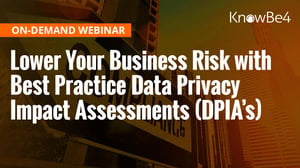.jpg?width=300&name=DataPrivacyDay%20(1).jpg) Privacy issues came about all across the board in 2020, and 2021 will be no different. From WhatsApp updating their terms of service and losing millions of users to countless proposals by legislatures to enact stricter privacy laws, and the interconnectedness of everything and everyone in our lives, we will begin to see huge advancements in the area of data privacy over the next year. I’ll take it up a notch and say that 2021 starts the next decade of privacy - and let's start with Data Privacy Day.
Privacy issues came about all across the board in 2020, and 2021 will be no different. From WhatsApp updating their terms of service and losing millions of users to countless proposals by legislatures to enact stricter privacy laws, and the interconnectedness of everything and everyone in our lives, we will begin to see huge advancements in the area of data privacy over the next year. I’ll take it up a notch and say that 2021 starts the next decade of privacy - and let's start with Data Privacy Day.
Beginning this year, the next decade will be one where privacy rights will be at the forefront of some of the largest issues -- especially since just about everything is now a data collection point (newer vehicles, IoT, etc.). Privacy will also begin to be an expectation in the workplace, at least in the United States. The actions taken by legislature, lobbyists and consumers over the next year or two will ultimately decide how our individual privacy and digital rights are protected over the next decade.
Although all of these privacy enhancements are occurring, we can’t wait for laws to be enacted in order to protect our privacy. We need to begin practicing good privacy hygiene in order to avoid being placed in a compromising position in the first place. I’ll go over a few quick tips you can take right now to practice better privacy hygiene (and no, it will not involve reading privacy notices).
- Review your social media privacy settings. From Linkedin to Facebook, it’s important for you to check your privacy settings every year to ensure they are where you want them to be. These organizations are continuously improving their privacy protections and features, and it’s good practice to review them at the start of every year to see if there is anything you’d like to change.
- If you are using the same password for multiple accounts across the internet, it’s time for you to change your passwords and move to a password manager. It’s easy, safe and secure.
- Check your browser privacy settings. Certain browsers allow you more control over how websites can track you. I would suggest you take a look at some of the features afforded to you and take advantage of them where you can. You can potentially block some nefarious websites from tracking your web movement by disabling third-party cookies in your browser.
- Opt out of third party advertisements by visiting Network Advertising. This is a quick and easy way to opt out of swaths of third-party advertising and tracking.
Lastly, only share information that you’re okay with being on the internet forever. Once you share something on the web, there is no real way to take it back, so be cognizant of what you are sharing. Data privacy will be at the forefront of our future, especially as everything continues to become more interconnected. It’s important that you stay vigilant to ensure that your data and your privacy is protected.
 Whether you're creating a new product, going through a merger & acquisition or significantly changing a process in your organization,
Whether you're creating a new product, going through a merger & acquisition or significantly changing a process in your organization, 



